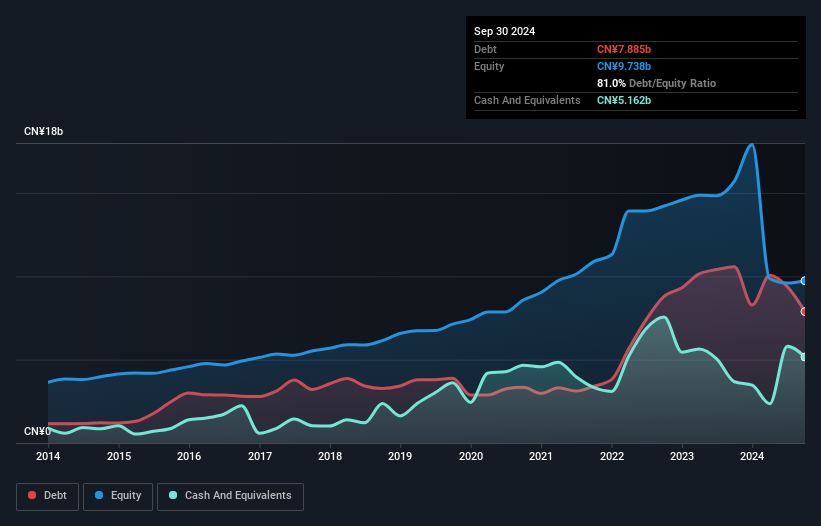- China
- /
- Infrastructure
- /
- SZSE:000828
Here's Why Dongguan Development (Holdings) (SZSE:000828) Has A Meaningful Debt Burden

David Iben put it well when he said, 'Volatility is not a risk we care about. What we care about is avoiding the permanent loss of capital.' So it seems the smart money knows that debt - which is usually involved in bankruptcies - is a very important factor, when you assess how risky a company is. We can see that Dongguan Development (Holdings) Co., Ltd. (SZSE:000828) does use debt in its business. But the more important question is: how much risk is that debt creating?
When Is Debt A Problem?
Debt is a tool to help businesses grow, but if a business is incapable of paying off its lenders, then it exists at their mercy. In the worst case scenario, a company can go bankrupt if it cannot pay its creditors. However, a more usual (but still expensive) situation is where a company must dilute shareholders at a cheap share price simply to get debt under control. Of course, debt can be an important tool in businesses, particularly capital heavy businesses. The first thing to do when considering how much debt a business uses is to look at its cash and debt together.
See our latest analysis for Dongguan Development (Holdings)
What Is Dongguan Development (Holdings)'s Net Debt?
As you can see below, Dongguan Development (Holdings) had CN¥7.88b of debt at September 2024, down from CN¥10.6b a year prior. On the flip side, it has CN¥5.16b in cash leading to net debt of about CN¥2.72b.

How Healthy Is Dongguan Development (Holdings)'s Balance Sheet?
The latest balance sheet data shows that Dongguan Development (Holdings) had liabilities of CN¥4.21b due within a year, and liabilities of CN¥4.14b falling due after that. On the other hand, it had cash of CN¥5.16b and CN¥1.03b worth of receivables due within a year. So its liabilities outweigh the sum of its cash and (near-term) receivables by CN¥2.15b.
Since publicly traded Dongguan Development (Holdings) shares are worth a total of CN¥11.1b, it seems unlikely that this level of liabilities would be a major threat. Having said that, it's clear that we should continue to monitor its balance sheet, lest it change for the worse.
In order to size up a company's debt relative to its earnings, we calculate its net debt divided by its earnings before interest, tax, depreciation, and amortization (EBITDA) and its earnings before interest and tax (EBIT) divided by its interest expense (its interest cover). Thus we consider debt relative to earnings both with and without depreciation and amortization expenses.
We'd say that Dongguan Development (Holdings)'s moderate net debt to EBITDA ratio ( being 2.3), indicates prudence when it comes to debt. And its strong interest cover of 1k times, makes us even more comfortable. Unfortunately, Dongguan Development (Holdings) saw its EBIT slide 9.0% in the last twelve months. If that earnings trend continues then its debt load will grow heavy like the heart of a polar bear watching its sole cub. When analysing debt levels, the balance sheet is the obvious place to start. But you can't view debt in total isolation; since Dongguan Development (Holdings) will need earnings to service that debt. So if you're keen to discover more about its earnings, it might be worth checking out this graph of its long term earnings trend.
Finally, a business needs free cash flow to pay off debt; accounting profits just don't cut it. So it's worth checking how much of that EBIT is backed by free cash flow. During the last three years, Dongguan Development (Holdings) burned a lot of cash. While investors are no doubt expecting a reversal of that situation in due course, it clearly does mean its use of debt is more risky.
Our View
Neither Dongguan Development (Holdings)'s ability to convert EBIT to free cash flow nor its EBIT growth rate gave us confidence in its ability to take on more debt. But its interest cover tells a very different story, and suggests some resilience. We should also note that Infrastructure industry companies like Dongguan Development (Holdings) commonly do use debt without problems. When we consider all the factors discussed, it seems to us that Dongguan Development (Holdings) is taking some risks with its use of debt. So while that leverage does boost returns on equity, we wouldn't really want to see it increase from here. When analysing debt levels, the balance sheet is the obvious place to start. However, not all investment risk resides within the balance sheet - far from it. Case in point: We've spotted 3 warning signs for Dongguan Development (Holdings) you should be aware of, and 1 of them doesn't sit too well with us.
At the end of the day, it's often better to focus on companies that are free from net debt. You can access our special list of such companies (all with a track record of profit growth). It's free.
New: Manage All Your Stock Portfolios in One Place
We've created the ultimate portfolio companion for stock investors, and it's free.
• Connect an unlimited number of Portfolios and see your total in one currency
• Be alerted to new Warning Signs or Risks via email or mobile
• Track the Fair Value of your stocks
Have feedback on this article? Concerned about the content? Get in touch with us directly. Alternatively, email editorial-team (at) simplywallst.com.
This article by Simply Wall St is general in nature. We provide commentary based on historical data and analyst forecasts only using an unbiased methodology and our articles are not intended to be financial advice. It does not constitute a recommendation to buy or sell any stock, and does not take account of your objectives, or your financial situation. We aim to bring you long-term focused analysis driven by fundamental data. Note that our analysis may not factor in the latest price-sensitive company announcements or qualitative material. Simply Wall St has no position in any stocks mentioned.
About SZSE:000828
Dongguan Development (Holdings)
Dongguan Development (Holdings) Co., Ltd.
Excellent balance sheet established dividend payer.
Market Insights
Community Narratives



